Defence dependence on US has long ended, says PM
We have Chinese, European and Russian defence systems, says Abbasi
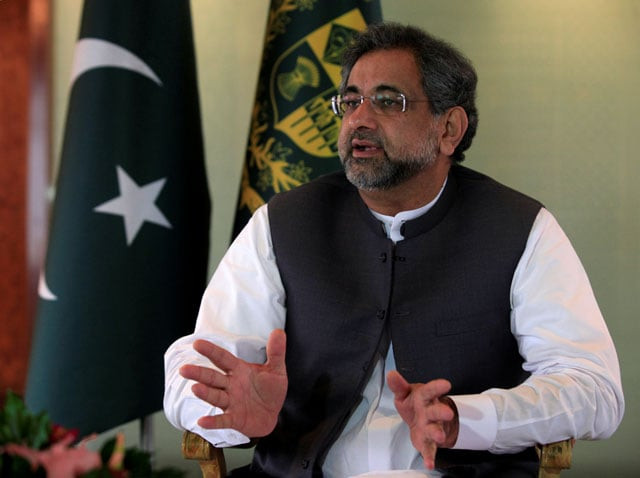
Prime MInister Shahid Khaqan Abbasi. PHOTO: REUTERS
“We have major US weapons systems in our military, but we’ve also diversified [our arsenal]. We have Chinese and European systems. Recently, we inducted [in our arsenal] Russian attack helicopters for the first time,” Abbasi said in his interview with Arab News on Monday
“If one source dries up, we have no option but to go to another source. It may cost more; it may consume more resources but we have to fight that war [against terrorism], and that’s what we emphasised to all the people that we [have] met,” he added.
Trump plans to send lieutenants to Pakistan with tough message
The premier, however, warned the United States that any sanctions or restraints put on the country's systems would only degrade the efforts to fight terror and affect equation in the region. He also made it clear that Washington’s desire to include India as a stakeholder in Afghanistan would be detrimental.
“We don’t believe that injecting India into the Pakistan-US relationship will help resolve anything, especially in Afghanistan, where we don’t see any role for India. India has a relationship with the US. That is between them and the US.”
Abbasi said Pakistan wanted peace in Afghanistan via a solution that was owned and led by the Afghans. We could categorically state that we do not provide any sanctuaries to anybody, he added. Today, the reality is that much of the areas bordering Pakistan are controlled by the Taliban.
“The people we’re fighting in Pakistan today have their sanctuaries in Afghanistan, their leadership is living there, the planning is done there, the logistical bases are there, and they regularly cross the border and attack our installations."
Easing tension: Ahsan Iqbal will jet off to US this week
“[In order to counter these safe havens] we’re fencing our border. We’re open to Afghan liaison officers. We have Afghan refugees here. So, if anything is pinpointed and intelligence is provided, we take action,” he added.
On his interactions on the sidelines of the UN General Assembly in New York, Abbasi said he had met key players including eight heads of state, UN secretary-general, US Vice President Mike Pence and international investors.
He said a ‘candid’ discussion with Pence was essential for official engagements in the future because when Trump’s policy statement on South Asia came out, there were a lot of apprehensions on what it meant, and what it meant for Pakistan-US relations.
“I think we moved substantially forward in that direction. Whatever concerns they [the US] have, we’ve shown our willingness to address those concerns,” he added. “Pakistan wants an equal relationship or partnership with the US, like every other nation.”
“The bottom line is today we have a common objective: To destroy terror and bring peace to Afghanistan. We’re partners in the war on terror, and that’s what we emphasised.
Trump lays down Afghan strategy, lambasts Pakistan for 'harbouring terrorists'
“We emphasised to everybody we met there [at the UNGA] that nobody wants peace in Afghanistan more than Pakistan,” he added.
Abbasi said Pakistan had fought ‘a very hard and vicious’ war on terror, adding that 200,000 of its troops had been deployed to fight militancy; 6,500 troops had laid down their lives, 21,000 civilians and policemen had been killed and almost 35,000 people had been seriously injured in terror attacks.
“Nobody has fought a bigger war on terror than we have, with our own resources. Even the most conservative economic estimates of Pakistan’s losses are over $120 billion. It has been a very difficult war, but our army has performed very well," he added.
The premier said the government faced a barrage of domestic and international challenges, including that of terrorism, energy crisis, and economic and regional volatility. “Governing a country with a ballooning population of over 207 million is no walk in the park,” he added.
"We have a neighbour to the east with which we’ve had several wars. They are also a nuclear power. We have a dispute. They occupied Kashmir, which is our territory,” he said
To a question on the next general election, Abbasi said, "Whatever happens, elections will happen on time and in early August. Pakistan will, God willing, have a new government. Hopefully, the same party [PML-N] will come to power,” he said.
Watch the full interview here:

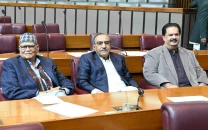
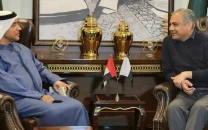
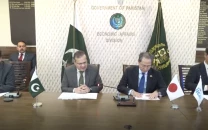
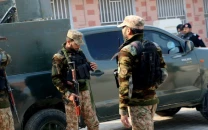
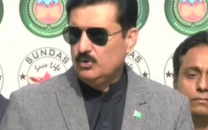













COMMENTS
Comments are moderated and generally will be posted if they are on-topic and not abusive.
For more information, please see our Comments FAQ